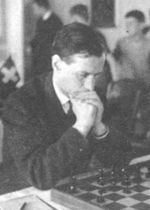Penrose Dr. Jonathan O.B.E. (07.10.1933)
 British International Master (1961), International Correspondence Chess Grandmaster (1983) and ten times British Champion. His father and mother both played chess and his father, Professor L.S. Penrose, in addition to being a geneticist of worldwide fame, was a strong chess player and a good endgame composer. Jonathan’s elder brother, Oliver, was also a fine player.
British International Master (1961), International Correspondence Chess Grandmaster (1983) and ten times British Champion. His father and mother both played chess and his father, Professor L.S. Penrose, in addition to being a geneticist of worldwide fame, was a strong chess player and a good endgame composer. Jonathan’s elder brother, Oliver, was also a fine player.
Jonathan learned chess at the age of four, won the British Boys’ Championships at thirteen and by the time he was fifteen, was playing in the British Championship at Felixstowe in 1949. A little reluctant to participate in international tournaments abroad, he did the best in the British Championship, which he won a record number of times, one more than H.E. Atkins. He won the title consecutively from 1958 to 1963 and again from 1966 to 1969.
He also played with great results in nine Olympiads. Playing at a high board for practically all the time, he showed himself the equal of the best of Grandmasters and indeed, at the Leipzig Olympiad, he distinguished himself by beating Mikhail Tal, thereby becoming the first British player to defeat a reigning World Champion since Joseph Blackburne beat Emanuel Lasker in 1899.
He scored +10=5 at board 1 at Lugano Olympiad 1968, a result bettered only by the World Champion, Tigran Petrosian. A deep strategist who could also hold his own tactically, he suffered from the defect of insufficient physical stamina, and it was this that was to bring about a decline in his play and his results.
He collapsed during a game at the Ilford Chess Congress, and a year later, at the Siegen Olympiad of 1970, he had a more serious collapse that necessitated his withdrawal from the event after the preliminary groups had been played. The doctors found nothing vitally wrong with him, but it was apparent that a long hard tournament made demands on him that his physique could not sustain. He continued to play, but his result suffered from a lack of self-confidence and at the Nice Olympiad of 1974, he had a wretched result at board 3, winning only 1 game and losing 6 out of 15. Possibly too, his profession (a lecturer in psychology) was also absorbing him more and more, and he took part less and less in international and national chess.
He turned to correspondence play, was the highest rated postal player in the world 1987-89, and led the British team to victory in the Ninth Correspondence Olympiad (the first time the USSR had failed).
Yet he had already done enough to show that he was the equal of the greatest British players in his command and understanding of the game, and he ranks alongside Howard Staunton, Joseph Blackburne, Henry Atkins and C.H.O’D Alexander as a chess figure of world class at that time.



